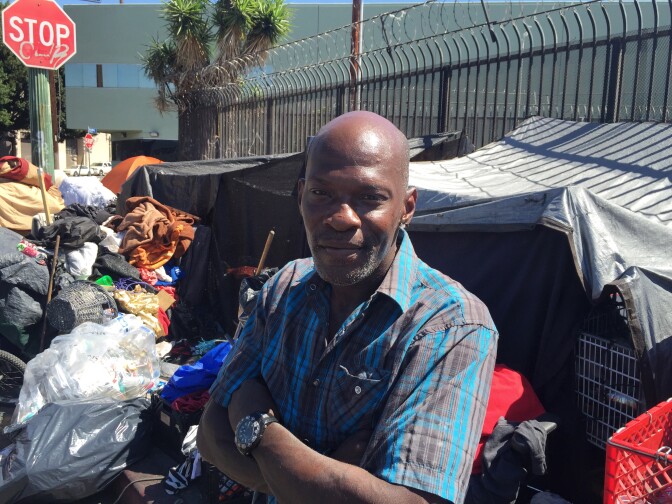This story is free to read because readers choose to support LAist. If you find value in independent local reporting, make a donation to power our newsroom today.
This archival content was originally written for and published on KPCC.org. Keep in mind that links and images may no longer work — and references may be outdated.
For homeless recyclers, center closures mean loss of income
Local recycling centers are disappearing in California, and that's hurting the small armies of people who make their living hunting through bins and scouring curbs for recyclables to turn in for cash.
Over 300 recycling centers across the state have closed in the past year, according to CalRecycle, the state agency that promotes recycling. The issue: the price the state reimburses centers for cans and bottles has dropped, making it an unsustainable business.
At A1 Electronics Recycling in South Los Angeles, owner Anthony Collins said he hasn't thought about shutting down, but he did stop accepting bottles and cans about four months ago because it's not economically viable.
“If you’re talking about rent, if you’re talking about power, you talking about any forklifts or anything you have to use, and also the employees, you’re not making enough money to properly sustain,” Collins said.
That's sent regular customers, like Heshimu Coleman, scrambling for a new recycling center.
Coleman, who lives in a tent down the street from A1, has had a hard time getting a good job. He’d been in and out of prison and institutions for over 20 years. To make money, he started recycling: cans, bottles, electronics, and anything else he could find wandering up and down the streets.
“It’s free money to go out and get as you please, you just have to have the hustle and the will about yourself to go out and go get it,” Coleman said. “It’s just like a job ... I'm like my own boss”
Coleman would go to A1 to turn in cans and bottles that he collected, and A1 would pay him on the spot. On an average day, he’d make about $60. On a good day, he’d make over $100.
Afterwards, A1 would pass the plastic and aluminum goods to the state to be recycled, and CalRecycle would reimburse the center with a subsidy through the beverage container program.
Though the back of a can might advertise a 5-cent redemption fee, recycling centers generally pay people bringing in more than 50 cans by weight. And in turn the state's rate to recycling centers is based on a formula, which takes into account prices of plastic and aluminum. Over the past four years, the values of those commodities has dropped. As a result, the state is paying less for the recycled cans and bottles.
The difference between what A1's Collins paid street recyclers like Coleman and the amount he got from the state was so large, he was losing money, so he stopped utilizing the program.

Now, Coleman still recycles, but he has to travel five times as far to get to the nearest open center. He doesn’t have a car, so he brings his bags of goods by bike.
“Man, it’s a long way to go,” Coleman said. “Especially in the summertime.”
That means less time spent collecting recyclables, and ultimately, less income.
Container Recycling Institute president Susan Collins said she mapped the remaining recycling centers and determined that the areas of Marina del Rey, Long Beach, and Venice are what she calls "recycling deserts" or "redemption deserts," or areas without recycling centers.
"I hope that the troubles that we are experiencing here in California don't give someone a negative impression of the law or the program as a whole," CRI's Collins said. "It's really just about changing and updating a formula so these folks get paid. It's that simple."
CalRecycle spokesman Mark Oldfield said that the formula, which is written into a state statute, has been giving recycling centers increased subsidies in the two most recent quarters.









